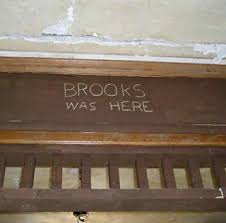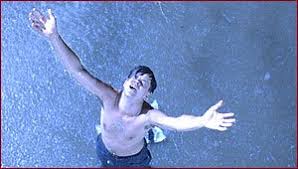by Aarron Pina | Dec 10, 2012 | Uncategorized
The point of Monday Morning Momentum is to ensure your week maintains the momentum you got from the shot in the arm your pastor gave you yesterday. I try to pass on some brief word that has me jazzed about jumping out of bed and taking a bite of of Monday. This week, I had a few great thoughts to share. But, none of them were as well ironed out as the one that I got in my email from Daniel Diadiggo a few weeks ago.
I’ve posted some of Daniel’s stuff here in the past – Diadiggo is one of those guys who “gets it” when it comes to Jesus, grace, and truth. He also really gets it when it comes to the pattern of this age and the pattern of God (example). On top of that, I find him to be an incredibly insightful and cogent writer, able to articulate complex ideas in a staggeringly simple way.
A few years ago, I witnessed one of his family’s traditions, performed at a local restaurant, called “Christmas Chronicles”. For the next few weeks, as I take some time off from the blog to soak more thoroughly in the word and unclutter some of my own brain at year end, I’ve chosen to unleash his “Christmas Chronicles” for your consumption and cogitation.
I hope as you disciple others it will serve as a helpful framework for sharing important truths about Christmas, Christ, and the God who loves us with a crazy, crazy love. It’s a tradition I’m sure the Pina family will adopt in years to come and I hope it proves to be a unique blessing to you as you and your family gather to celebrate the incarnation of a risen Savior.
Merry Monday Momentum & Merry, Merry Christmas!
—
 Foreword: Twenty-two years ago as newlyweds, Kelle and I invited family and friends to our tiny, rented duplex to read the Christmas story. Together, we read Scripture, prayed, and sang hymns. Sprinkled in between were some vignettes I wrote which were spoken by alternating readers. The idea has survived as a family tradition in some form through the years and has become known locally (as in our family room) as “the Christmas Chronicles”. dcd
Foreword: Twenty-two years ago as newlyweds, Kelle and I invited family and friends to our tiny, rented duplex to read the Christmas story. Together, we read Scripture, prayed, and sang hymns. Sprinkled in between were some vignettes I wrote which were spoken by alternating readers. The idea has survived as a family tradition in some form through the years and has become known locally (as in our family room) as “the Christmas Chronicles”. dcd
#1 in the midst of the mundane
Read:
In those days Caesar Augustus issued a decree that a census should be taken of the entire Roman world. (This was the first census that took place while Quirinius was governor of Syria.) And everyone went to his own town to register. So Joseph also went up from the town of Nazareth in Galilee to Judea, to Bethlehem the town of David, because he belonged to the house and line of David.
Luke 2:1-4
Speak:
Joseph was doing his taxes when Jesus was born. He was rendering to Caesar that which was Caesar’s – he was giving the world it’s due.
What a pain.
Life is a strand of ordinary things, often inconvenient things.
… things we’re supposed to do
… things we have to do.
This was one of these.
Joseph hoisted his very pregnant betrothed onto a donkey and set out for Bethlehem because
… that’s what he was supposed to do.
It was in Bethlehem, in the middle of Joseph’s drudgery
that God punctured time and appeared in flesh.
God does that a lot.
He interrupts our routines…
At the most inconvenient of times
…when we’re bothered by something else
…times when we’re too busy to pay attention
God breaks through
And delivers… LIFE!!
Pray:
Lord, thank you for the mundane – for those burdens You have pressed upon us, for those things that are in the way. Thank You for delivering life into the midst of our mundane!
by Aarron Pina | Dec 3, 2012 | Uncategorized
Therefore, brothers and sisters, we have an obligation—but it is not to the flesh, to live according to it.For if you live according to the flesh, you will die; but if by the Spirit you put to death the misdeeds of the body, you will live.
(Romans 8:12-13)
Get Free, Stay Free
SPOILER ALERT: If you haven’t seen Shawshank, I’m about to tell you things that will “spoil” some of the surprises in the plot.
Okay, let’s talk “The Shawshank Redemption”. Smart script, brilliant plot, bad theology (e.g., “it’s okay to steal money from a thief and take the law into your own hands”?), coarse language. You don’t need to see it.
Their Story, Much Like Yours “Not Guilty?”
 Main character, – “Andy Dufresne” (Tim Robbins), convicted on circumstantial evidence of a murder he didn’t commit. Sent to Shawshank prison where he falls in with a bunch of “not so bad” guys including “Red” (Morgan Freeman) and an old timer named “Brooks” (James Whitmore), who’s been in prison for about 50 years. Every one of these men, much like you and I “didn’t do it”, right? “Innocent men.” At least, that’s their story. What’s yours?
Main character, – “Andy Dufresne” (Tim Robbins), convicted on circumstantial evidence of a murder he didn’t commit. Sent to Shawshank prison where he falls in with a bunch of “not so bad” guys including “Red” (Morgan Freeman) and an old timer named “Brooks” (James Whitmore), who’s been in prison for about 50 years. Every one of these men, much like you and I “didn’t do it”, right? “Innocent men.” At least, that’s their story. What’s yours?
Brooks isn’t the main thrust of the movie, but he provides insight into a problem you and I face on a daily basis, and a problem that’s been weighing on a guy I’m discipling right now, whom I’ll call “Hank”. Brooks spends 50 years entrenched in prison culture before he’s paroled as an old man. Hank’s a lot like Brooks. He’s been imprisoned by his past – shameful things he’s said and done – and now in Christ his term is over and he’s out on parole so to speak. (Note: theologically, Hank’s in a different situation because he’s really been pardoned, not paroled, but in the eyes of the law, he’s a free man. Tracking?)
Brooks realizes in a sharp hurry that 50 years of being told when to eat, when to go to the bathroom, when to sleep, etc. that making his own decisions and “walking in freedom” is utterly foreign to him. He becomes overwhelmed by “life on the outside” because he’s so used to “life on the inside”. In desperation, Brooks carves a note on the rafter in the room he’s rented and hangs himself.
When his final letter reaches the old inmate buddies back at Shawshank, Red explains to Andy the concept known as “institutional syndrome”:
“individuals in institutions may be deprived (unintentionally) of independence and of responsibility, to the point that once they return to “outside life” they are often unable to manage many of its demands” – Wikipedia, “Institutional Syndrome”
or, as Red explains the effects of being behind prison walls to Andy:
“These walls are funny. First you hate them, then you get used to them. After long enough, you get so you depend on them. That’s “institutionalized.””
Are You “Hanking It”?
I’m sitting down with Hank last month and he seems stuck in neutral. He’s bitter and puzzled about it. “You sound like you feel… ‘stuck’. What’s got you stuck?” He lands on some things he can’t forgive someone for and the things he can’t ask forgiveness for. He’s got a bad habit – pride. Huh? Let me explain. I asked him what causes him to not ask forgiveness and he nails it after only a three second pause. “Pride.” But, pride is a habit, a prison wall we build ourselves…
“Hank, do you realize she’s [the person who offended him repeatedly] has been forgiven by Jesus what that means?” He squints and thinks… “Essentially, you’re looking at her and saying ‘Jesus forgives you, but I have a little bit higher standard for you than He does…”
Pride… Pretty ugly, right?
So, what does this have to do with you and I?
Leave the Walls Behind
Ephesians tells us to put off the old self… and put on the new self… Scripture tells us we are “new creations”. But, Brooks didn’t feel free even when he stepped out of the prison walls. He was so used to the old flesh, the old habits, the old walls that he reverted back to prison mentality even when set free. Hank is so used to forgiveness being about his standards, that now as a believer in Christ’s substitutionary atonement, he’s having a hard time walking in freedom without imprisoning others with him… Ouch.
 |
Andy Dufresne stands in the rain outside
Shawshank prison for the first time as a
“free man”. You and I are washed clean by
the blood of Christ. We have an even greater hope. |
Red called it. Are you depending on the prison walls from your old self? Are you putting your confidence in the flesh? A friend wrote on his Facebook wall last week something to this effect: “Christianity is freedom. But prison is often so hard to leave…” Andy Dufresne knew what he’d do with his freedom – he had hope in something greater. He hadn’t put so much faith in the prison, fear, and shame that he’d forgotten what freedom could look like.
So, today, will you walk in freedom? Will you consider your ways and the freedom that is available from the lies of shame and guilt? Leave the walls behind. You’re free. Walk free.
 Foreword: Twenty-two years ago as newlyweds, Kelle and I invited family and friends to our tiny, rented duplex to read the Christmas story. Together, we read Scripture, prayed, and sang hymns. Sprinkled in between were some vignettes I wrote which were spoken by alternating readers. The idea has survived as a family tradition in some form through the years and has become known locally (as in our family room) as “the Christmas Chronicles”. dcd
Foreword: Twenty-two years ago as newlyweds, Kelle and I invited family and friends to our tiny, rented duplex to read the Christmas story. Together, we read Scripture, prayed, and sang hymns. Sprinkled in between were some vignettes I wrote which were spoken by alternating readers. The idea has survived as a family tradition in some form through the years and has become known locally (as in our family room) as “the Christmas Chronicles”. dcd

